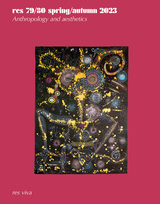68 have author last names that start with S have author last names that start with S

The Art of Teaching Spanish explores in-depth the findings of research in second language acquisition (SLA) and other language-related fields and translates those findings into practical pedagogical tools for current—and future—Spanish-language instructors. This volume addresses how theoretical frameworks affect the application of research findings to the teaching of Spanish, how logistical factors affect the way research findings can be applied to teach Spanish, and how findings from Spanish SLA research would be applicable to Spanish second language teaching and represented in Spanish curricula through objectives and goals (as evidenced in pedagogical materials such as textbooks and computer-assisted language learning software).
Top SLA researchers and applied linguists lend their expertise on matters such as foreign language across curriculum programs, testing, online learning, the incorporation of linguistic variation into the classroom, heritage language learners, the teaching of translation, the effects of study abroad and classroom contexts on learning, and other pedagogical issues. Other common themes of The Art of Teaching Spanish include the rejection of the concept of a monolithic language competence, the importance of language as social practice and cultural competence, the psycholinguistic component of SLA, and the need for more cross-fertilization from related fields.

A call to reform Catholic health care ethics, inspired by the teachings of Pope Francis
Since its first edition in 1948, the US Conference of Catholic Bishops’ Ethical and Religious Directives for Catholic Health Care Services (ERD) has guided Catholic institutions in the provision of health care that reflects both the healing ministry of Jesus and the Church’s understanding of human dignity. However, while the papacy of Pope Francis and the clerical sex-abuse scandal both profoundly impacted the Catholic Church, the latest edition of the ERD does not address or reflect these transformations.
Now for the first time, Todd A. Salzman and Michael G. Lawler present an extended critical commentary on the 2018 ERD. They argue that it is problematic in a number of ways. First, the revised ERD continues to prioritize a rule-based over a personalist-based ethical method, with an emphasis on absolute norms that proscribe specific medical acts. Further, it does not take into account Pope Francis’s transforming ecclesiological, methodological, and anthropological visions, neither internally in Catholic health care institutions nor externally in collaborations between Catholic and non-Catholic health care institutions. Finally, the revised ERD provides no evidence that the bishops grasp how the clerical sex-abuse scandal and its cover-up have fundamentally undermined episcopal authority and credibility.
Salzman and Lawler propose new ways forward for US Catholic health care ethics that prioritize human dignity as their guiding principle. As there is pluralism in Catholic definitions of human dignity, there must be pluralism in the norms and directives that facilitate realizing human dignity. Pope Francis’s emphasis on the virtues of mercy and care should move the ERD forward from a focus on absolute norms in medical ethics to a focus on virtues and principles to guide both patients and health care professionals in their discerned conscientious health care decisions.

Two principles capture the essence of the official Catholic position on the morality of sexuality: first, that any human genital act must occur within the framework of heterosexual marriage; second, each and every marriage act must remain open to the transmission of life. In this comprehensive overview of Catholicism and sexuality, theologians Todd A. Salzman and Michael G. Lawler examine and challenge these principles. Remaining firmly within the Catholic tradition, they contend that the church is being inconsistent in its teaching by adopting a dynamic, historically conscious anthropology and worldview on social ethics and the interpretation of scripture while adopting a static, classicist anthropology and worldview on sexual ethics.
While some documents from Vatican II, like Gaudium et spes ("the marital act promotes self-giving by which spouses enrich each other"), gave hope for a renewed understanding of sexuality, the church has not carried out the full implications of this approach. In short, say Salzman and Lawler: emphasize relationships, not acts, and recognize Christianity's historically and culturally conditioned understanding of human sexuality. The Sexual Person draws historically, methodologically, and anthropologically from the best of Catholic tradition and provides a context for current theological debates between traditionalists and revisionists regarding marriage, cohabitation, homosexuality, reproductive technologies, and what it means to be human. This daring and potentially revolutionary book will be sure to provoke constructive dialogue among theologians, and between theologians and the Magisterium.

Two principles capture the essence of the Catholic tradition on sexual ethics: that each and every marriage act must remain open to the transmission of life, and that any human genital act must occur within the framework of marriage. In the Catholic tradition, moral sexual activity is institutionalized within the confines of marriage and procreation, and sexual morality is marital morality.
But theologians Todd Salzman and Michael Lawler contend that there is a disconnect between many of the Church’s absolute sexual norms and other theological and intellectual developments explicitly recognized and endorsed in the Catholic tradition, especially since the Second Vatican Council. These developments include the shift from a primary static worldview to a historically conscious worldview, one that recognizes reality as dynamic, evolving, changing, and particular. By employing such a historically conscious worldview, alternative claims about the moral legitimacy of controversial topics such as contraception, artificial reproduction, and homosexual marriage can faithfully emerge within a Catholic context. Convinced of the central role that love, desire, and fertility play in a human life, and also in the life of Christian discipleship, the authors propose an understanding of sexuality that leads to the enhancement of human sexual relationships and flourishing.
This comprehensive introduction to Catholic sexual ethics—complete with thought-provoking study questions at the end of each chapter—will be sure to stimulate dialogue about sexual morality between Catholic laity, theologians, and the hierarchy. Anyone seeking a credible and informed Catholic sexual ethic will welcome this potentially revolutionary book.
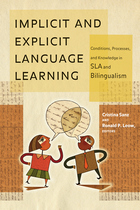
Over the last several decades, neuroscientists, cognitive psychologists, and psycholinguists have investigated the implicit and explicit continuum in language development and use from theoretical, empirical, and methodological perspectives. This book addresses these perspectives in an effort to build connections among them and to draw pedagogical implications when possible.
The volume includes an examination of the psychological and neurological processes of implicit and explicit learning, what aspects of language learning can be affected by explicit learning, and the effects of bilingualism on the mental processing of language. Rigorous empirical research investigations probe specific aspects of acquiring morphosyntax and phonology, including early input, production, feedback, age, and study abroad. A final section explores the rich insights provided into language processing by bilingualism, including such major areas as aging, third language acquisition, and language separation.

How do people learn nonnative languages? Is there one part or function of our brains solely dedicated to language processing, or do we apply our general information-processing abilities when learning a new language? In this book, an interdisciplinary collaboration of scholars and researchers presents an overview of the latter approach to adult second language acquisition and brings together, for the first time, a comprehensive picture of the latest research on this subject.
Clearly organized into four distinct but integrated parts, Mind and Context in Adult Second Language Acquisition first provides an introduction to information-processing approaches and the tools for students to understand the data. The next sections explain factors that affect language learning, both internal (attention and awareness, individual differences, and the neural bases of language acquisition) and external (input, interaction, and pedagogical interventions). It concludes by looking at two pedagogical applications: processing instruction and content based instruction.
This important and timely volume is a must-read for students of language learning, second language acquisition, and linguists who want to better understand the information-processing approaches to learning a non-primary language. This book will also be of immense interest to language scholars, program directors, teachers, and administrators in both second language acquisition and cognitive psychology.

The Georgetown Journal of International Affairs is the official publication of the Edmund A. Walsh School of Foreign Service at Georgetown University. Each issue of the journal provides readers with a diverse array of timely, peer-reviewed content penned by top policymakers, business leaders, and academic luminaries.

The Georgetown Journal of International Affairs is the official publication of the Edmund A. Walsh School of Foreign Service at Georgetown University. Founded to serve as an academic resource for scholars, business leaders, policymakers, and students of international relations alike, the journal cultivates a dialogue accessible to those with varying levels of knowledge about foreign affairs and international politics. Each volume year the journal provides readers with three issues featuring an array of timely, peer-reviewed content that bridges the gap between the work performed by news outlets and that by more traditional academic journals. The first two issues feature a section titled "Forum" that offers focused analysis on a specific key issue, as well as eight regular sections: Books, Business & Economics, Conflict & Security, Culture & Society, Dialogues, Law & Ethics, Politics & Diplomacy, and Science & Technology. The third is a special issue, International Engagement on Cyber. Issue 18.1’s Forum theme is the "global commons," with articles on the Internet as a global public good, the implications of military and security uses of outer space, and international water management challenges.

Success in war ultimately depends on the consolidation of political order. Nadia Schadlow argues that the steps needed to consolidate a new political order are not separate from war. They are instead an essential component of war and victory.
The challenge of governance operations did not start with the wars in Iraq and Afghanistan. The US Army’s involvement in the political and economic reconstruction of states has been central to all its armed conflicts from large-scale conventional wars to so-called irregular or counterinsurgency wars. Yet, US policymakers and military leaders have failed to institutionalize lessons on how to consolidate combat gains into desired political outcomes. War and the Art of Governance examines fifteen historical cases of US Army military interventions, from the Mexican War through the wars in Iraq and Afghanistan. Improving future outcomes will require US policymakers and military leaders to accept that plans, timelines, and resources must be shaped to reflect this reality before they intervene in a conflict, not after things go wrong.
Schadlow provides clear lessons for students and scholars of security studies and military history, as well as for policymakers and the military personnel who will be involved in the next foreign intervention.
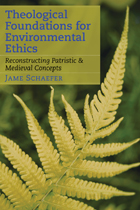
Earth is imperiled. Human activities are adversely affecting the land, water, air, and myriad forms of biological life that comprise the ecosystems of our planet. Indicators of global warming and holes in the ozone layer inhibit functions vital to the biosphere. Environmental damage to the planet becomes damaging to human health and well-being now and into the future—and too often that damage affects those who are least able to protect themselves.
Can religion make a positive contribution to preventing further destruction of biological diversity and ecosystems and threats to our earth? Jame Schaefer thinks that it can, and she examines the thought of Christian Church fathers and medieval theologians to reveal and retrieve insights that may speak to our current plight. By reconstructing the teachings of Augustine, Thomas Aquinas, and other classic thinkers to reflect our current scientific understanding of the world, Schaefer shows how to "green" the Catholic faith: to value the goodness of creation, to appreciate the beauty of creation, to respect creation's praise for God, to acknowledge the kinship of all creatures, to use creation with gratitude and restraint, and to live virtuously within the earth community.

Giving particular attention to intergovernmental working relationships, this revised edition of Federalism and Environmental Policy has been significantly updated to reflect the changes that have taken place since the highly praised first edition. Denise Scheberle examines reasons why environmental laws seldom work out exactly as planned. Casting federal-state working relationships as "pulling together," "coming apart," or somewhere in-between, she provides dozens of observations from federal and state officials. This study also suggests that implementation of environmental policy is a story of high stakes politics—a story rich with contextual factors and as fascinating as the time the policy was formulated.
As four very different environmental programs unfold—asbestos (updated to include the fallout from the World Trade Center), drinking water, radon, and surface coal mining—Scheberle demonstrates how programs evolve differently, with individual political, economic, logistical, and technical constraints. The policy implementation framework developed for the book provides the lens through which to compare environmental laws.
Federalism and Environmental Policy goes beyond the contents of policy to explore the complex web of federal-state working relationships and their effect on the implementation of policy. It is unique in how it portrays the nuts-and-bolts, the extent to which the state and federal offices work together effectively—or not. Examining working relationships within the context of program implementation and across four different environmental programs offers a unique perspective on why environmental laws sometimes go awry.

Those who do not have their heads buried too deeply in partisan sands will know that there is something awry with the American form of electoral democracy. Florida's continuing ability to misplace votes recently and in the 2000 Presidential election is only part of the iceberg we have been made privy to-and Steven Schier takes a good, hard, evaluative look not only at what is there in plain sight, but that which lurks below the surface (and not only in Florida and not only with the electoral college). He further proposes practical improvements that will make our surprisingly peculiar democratic processes healthy, whole, and responsive again.
Identifying four essential evaluative criteria for a democracy that genuinely works, Schier asks us to examine the degree to which our system promotes political stability, the degree to which our elected officials are held accountable, what the problems are with voter turnout and how to improve it, and asks for a meaningful scrutiny of governmental policy.
No look at our peculiar democracy would be complete without an examination of other established democracies, nor a look at how special interests warp political parties and the concept of majority rule. The solution to many of our electoral problems, Schier argues, lies in enhancing the roles and influence of political parties. Schier proposes reforms that include broadening voter registration; giving parties large blocks of free TV time; adopting one-punch partisan ballots, making it easier for voters to cast a straight-party vote; abandoning initiatives which clutter up the ballot; and utilizing party-based financing to boost voter turnout. With these proposals, he encourages the creative consideration of election reform, and shows how the Florida 2000 race may have played out had these suggestions been in place.
Schier's book appeals to any and every citizen interested in our electoral system and its role in governmental politics. It is invaluable for professionals in political science and ideal for students in American government, political parties, elections, and political behavior courses, as well for political scientists. Any citizens concerned about the conduct of American elections will discover here a fresh and focused analysis of our problems at the ballot box.
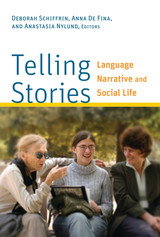
Narratives are fundamental to our lives: we dream, plan, complain, endorse, entertain, teach, learn, and reminisce through telling stories. They provide hopes, enhance or mitigate disappointments, challenge or support moral order and test out theories of the world at both personal and communal levels. It is because of this deep embedding of narrative in everyday life that its study has become a wide research field including disciplines as diverse as linguistics, literary theory, folklore, clinical psychology, cognitive and developmental psychology, anthropology, sociology, and history.
In Telling Stories leading scholars illustrate how narratives build bridges among language, identity, interaction, society, and culture; and they investigate various settings such as therapeutic and medical encounters, educational environments, politics, media, marketing, and public relations. They analyze a variety of topics from the narrative construction of self and identity to the telling of stories in different media and the roles that small and big life stories play in everyday social interactions and institutions. These new reflections on the theory and analysis of narrative offer the latest tools to researchers in the fields of discourse analysis and sociolinguistics.

This book is the first comprehensive examination of medical ethics in the Renaissance. It investigates the ethical considerations, evaluations of procedures, and techniques of problem-solving in the writings of European physicians and surgeons from the mid-sixteenth through the mid-seventeenth centuries.
While much of the medical practice and literature of the Renaissance remained a continuation or reinterpretation of ancient medicine, Winfried Schleiner reveals an emerging self-conscious field of medical ethics that should be considered modern, as it increasingly separates medicine from theology, the cure of the body from that of the soul. The exceptions to this trend appear in the discussions of certain sexual topics, such as masturbation, by physicians close to the Counter-Reformation. Analyzing the writings of Protestant, Catholic, and Jewish physicians—the latter developed the most secular medical ethics of the era—he probes the dominant and emerging philosophical ideas together with conceptions of the role of physicians and of physical well-being.
Schleiner selects several topics to explore the development of ethical ideas in depth: placebos and the broader issue of lying to patients; the treatment of hysteria; masturbation; and the prevention of sexually transmitted diseases—subjects that are still highly charged moral as well as medical topics today.
This pioneering study will be of value to ethicists and to historians of science, medicine, and Renaissance and gender studies.

What qualities make an ally useful in coalition warfare, and when is an ally more trouble than it’s worth? Allies That Count analyzes the utility of junior partners in coalition warfare and reaches surprising conclusions.
In this volume, Olivier Schmitt presents detailed case-study analysis of several US allies in the Gulf War, the Kosovo campaign, the Iraq War, and the war in Afghanistan. He also includes a broader comparative analysis of 204 junior partners in various interventions since the end of the Cold War. This analysis bridges a gap in previous studies about coalition warfare, while also contributing to policy debates about a recurring defense dilemma. Previous works about coalition warfare have focused on explaining how coalitions are formed, but little attention has been given to the issue of their effectiveness. Simultaneously, policy debates, have framed the issue of junior partners in multinational military operations in terms of a trade-off between the legitimacy that is allegedly gained from a large number of coalition states vs. the decrease in military effectiveness associated with the inherent difficulties of coalition warfare. Schmitt determines which political and military variables are more likely to create utility, and he challenges the conventional wisdom about the supposed benefit of having as many states as possible in a coalition. Allies That Count will be of interest to students and scholars of security studies and international relations as well as military practitioners and policymakers.

The Trump administration's war on asylum and what Congress and the Biden administration can do about it
Donald Trump’s 2016 campaign centered around immigration issues such as his promise to build a border wall separating the US and Mexico. While he never built a physical wall, he did erect a legal one. Over the past three years, the Trump administration has put forth regulations, policies, and practices all designed to end opportunities for asylum seekers. If left unchecked, these policies will effectually lead to the end of asylum, turning the United States—once a global leader in refugee aid—into a country with one of the most restrictive asylum systems.
In The End of Asylum, three experts in immigration law offer a comprehensive examination of the rise and demise of the US asylum system. Beginning with the Refugee Act of 1980, they describe how Congress adopted a definition of refugee based on the UN Refugee Convention and prescribed equitable and transparent procedures for a uniform asylum process. The authors then chart the evolution of this process, showing how Republican and Democratic administrations and Congresses tweaked the asylum system but maintained it as a means of protecting victims of persecution—until the Trump administration. By expanding his executive reach, twisting obscure provisions in the law, undermining past precedents, and creating additional obstacles for asylum seekers, Trump’s policies have effectively ended asylum. The book concludes with a roadmap and a call to action for the Biden administration and Congress to repair and reform the US asylum system.
This eye-opening work reveals the extent to which the Trump administration has dismantled fundamental American ideals of freedom from persecution and shows us what we can do about it.

A comprehensive historical study of the complete content and overall coherence of two and a half centuries of papal instructions that have variously aroused worldwide interest, scorn, fury, reaction, and consent. It provides the kind of analysis that concerned Roman Catholics, public officials, social ethicists, theologians, and students need. It is a textually inclusive and topically broad-gauged review of Catholic social teaching in its historical development, with a forthright assessment of its regrettable contradictions as well as of its valuable consistencies.
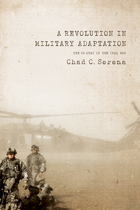
During the early years of the Iraq War, the US Army was unable to translate initial combat success into strategic and political victory. Iraq plunged into a complex insurgency, and defeating this insurgency required beating highly adaptive foes. A competition between the hierarchical and vertically integrated army and networked and horizontally integrated insurgents ensued. The latter could quickly adapt and conduct networked operations in a decentralized fashion; the former was predisposed to fighting via prescriptive plans under a centralized command and control.
To achieve success, the US Army went through a monumental process of organizational adaptation—a process driven by soldiers and leaders that spread throughout the institution and led to revolutionary changes in how the army supported and conducted its operations in Iraq. How the army adapted and the implications of this adaptation are the subject of this indispensable study. Intended for policymakers, defense and military professionals, military historians, and academics, this book offers a solid critique of the army’s current capacity to adapt to likely future adversary strategies and provides policy recommendations for retaining lessons learned in Iraq.
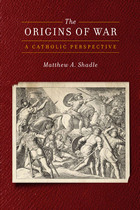
Debate rages within the Catholic Church about the ethics of war and peace, but the simple question of why wars begin is too often neglected. Catholics’ assumptions about the causes of conflict are almost always drawn uncritically from international relations theory—a field dominated by liberalism, realism, and Marxism—which is not always consistent with Catholic theology.
In The Origins of War, Matthew A. Shadle examines several sources to better understand why war happens. His retrieval of biblical literature and the teachings of figures from church tradition sets the course for the book. Shadle then explores the growing awareness of historical consciousness within the Catholic tradition—the way beliefs and actions are shaped by time, place, and culture. He examines the work of contemporary Catholic thinkers like Pope John Paul II, Jacques Maritain, John Courtney Murray, Dorothy Day, Brian Hehir, and George Weigel. In the constructive part of the book, Shadle analyzes the movement within international relations theory known as constructivism—which proposes that war is largely governed by a set of socially constructed and cultural influences. Constructivism, Shadle claims, presents a way of interpreting international politics that is highly amenable to a Catholic worldview and can provide a new direction for the Christian vocation of peacemaking.

Let Them Go Free offers families a way to cope with a problem particular to our time: what to do when medical treatment sustains life but does not cure or resuscitate a critically ill loved one. This straightforward and empathic guide helps such families affirm that their choice to remove life support is morally acceptable, warranted, and made in the spirit of love and care for the patient.
With an emphasis on maintaining openness and trust among all involved in the decision-making process, this helpful guide skillfully addresses the questions that must be asked to assess the best course of care for a loved one:
• What is the patient’s medical condition?
• What are the medical options?
• Has the patient expressed any wishes regarding his or her treatment?
• What if the patient hasn’t expressed any wishes regarding treatment?
• Do we have to do everything possible to keep the patient alive?
• Do we have to use artificial means of feeding?
• How do we handle disagreements?
• What should we do about donating organs?
Let Them Go Free also includes an ecumenical prayer service to be conducted as life support is withdrawn. Woven with readings and prayers from Hebrew and Christian scripture, the service is intended to give family and friends a moment to express their love for the patient, to say goodbye, and to find a sense of closure as they embark on the first stage of the grieving process.

According to a recent Institute of Medicine report, as many as 98,000 Americans die each year as a result of medical error—a figure higher than deaths from automobile accidents, breast cancer, or AIDS. That astounding number of fatalities does not include the number of those serious mistakes that are grievous and damaging but not fatal. Who can forget the tragic case of 17-year-old Jésica Santillán, who died after receiving a heart-lung transplant with an incompatible blood type? What can be done about this? What should be done? How can patients and their families regain a sense of trust in the hospitals and clinicians that care for them? Where do we even begin the discussion?
Accountability brings the issue to the table in response to the demand for patient safety and increased accountability regarding medical errors. In an interdisciplinary approach, Virginia Sharpe draws together the insights of patients and families who have suffered harm, institutional leaders galvanized to reform by tragic events in their own hospitals, philosophers, historians, and legal theorists. Many errors can be traced to flaws in complex systems of health care delivery, not flaws in individual performance. How then should we structure responsibility for medical mistakes so that justice for the injured can be achieved alongside the collection of information that can improve systems and prevent future error? Bringing together authoritative voices of family members, health care providers, and scholars—from such disciplines as medical history, economics, health policy, law, philosophy, and theology—this book examines how conventional structures of accountability in law and medical structure (structures paradoxically at odds with justice and safety) should be replaced by more ethically informed federal, state, and institutional policies. Accountability calls for public policy that creates not only systems capable of openness concerning safety and error—but policy that also delivers just compensation and honest and humane treatment to those patients and families who have suffered from harmful medical error.

Plunging into the verbal quagmire of official language used by bureaucrats in both government and business, distinguished linguist Roger W. Shuy develops new techniques based on linguistic principles to improve their communication with the public.
Shuy presents nine case studies that reveal representative problems with bureaucratic language. He characterizes the traits of bureaucratic language candidly, though somewhat sympathetically, and he describes how linguists can provide bureaucrats with both the tools for communicating more clearly and also the authority to implement these changes.
Drawing on documents cited in class action lawsuits brought against the Social Security Administration and Medicare, Shuy offers a detailed linguistic analysis of these agencies’ problems with written and oral communication, and he outlines a training program he developed for government writers to solve them. Moving on to the private sector, Shuy analyzes examples of the ways that businesses such as car dealerships, real estate and insurance companies, and commercial manufacturers sometimes fail to communicate effectively. Although typically bureaucracies change their use of language only when a lawsuit threatens, Shuy argues that clarity in communication is a cost effective strategy for preventing or at least reducing litigation.
Bureaucratic Language in Government and Business explains why bureaucratic language can be so hard to understand and what can be done about it.

This collection is the first to examine the effects of bilingualism and multilingualism on the development of dialectal varieties of Spanish in Africa, America, Asia and Europe. Nineteen essays investigate a variety of complex situations of contact between Spanish and typologically different languages, including Basque, Bantu languages, English, and Quechua. The overall picture that evolves clearly indicates that although influence from the contact languages may lead to different dialects, the core grammar of Spanish remains intact.
Silva-Corvalán's volume makes an important contribution both to sociolinguistics in general, and to Spanish linguistics in particular. The contributors address theoretical and empirical issues that advance our knowledge of what is a possible linguistic change, how languages change, and how changes spread in society in situations of intensive bilingualism and language contact, a situation that appears to be the norm rather than the exception in the world.

This thoroughly updated second edition provides a clear and comprehensive overview of sociolinguistics and the pragmatics of oral communication in Spanish. While maintaining the same structure as the first edition, it includes revised “Ejercicios de reflexión” and new comprehension checks at the end of each chapter, along with numerous bibliographic references throughout, enhancing its use as a classroom text. Among the significant revisions are new sections on corpus linguistics and on statistical modeling programs for studying linguistic variables, an expanded chapter on the study of linguistic attitudes with special attention to Spanish in the United States, greater attention to the relation of pragmatics to sociolinguistics, including coverage of verbal politeness and forms of address, and updated information on Spanglish and on the teaching of Spanish as a heritage language.

This book provides a clear and comprehensive overview of sociolinguistics and the pragmatics of oral communication in Spanish. Drawing on the research of foremost scholars in the field, Carmen Silva-Corvalán covers central concerns of variational sociolinguistics, discourse analysis, language change, and language contact, with special reference to Spanish in the United States.
A thoroughly revised and expanded version of Silva-Corvalán’s 1989 study, Sociolingüística: teoría y análisis, the book includes rigorous quantitative and qualitative analyses, and it documents such ongoing issues as language change in monolingual and bilingual communities, the nature of phonetic and syntactic variation, and modes of data collection and analysis. New topics include pragmatics and discourse analysis, discourse markers, and sociolinguistics and education.
Written in Spanish, Sociolingüística y pragmática del español will be welcomed by students and sociolinguistic researchers, who will find in it the ideal overview of the social aspects of language as well as a wealth of empirical data on Spanish linguistics. Complete with exercises at the end of each chapter and a convenient subject index, the book is appropriate for advanced undergraduates and graduate students of Spanish throughout the world.
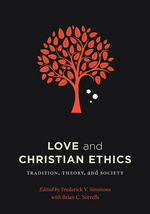
At the heart of Christian ethics is the biblical commandment to love God and to love one's neighbor as oneself. But what is the meaning of love? Scholars have wrestled with this question since the recording of the Christian gospels, and in recent decades teachers and students of Christian ethics have engaged in vigorous debates about appropriate interpretations and implications of this critical norm.
In Love and Christian Ethics, nearly two dozen leading experts analyze and assess the meaning of love from a wide range of perspectives. Chapters are organized into three areas: influential sources and exponents of Western Christian thought about the ethical significance of love, perennial theoretical questions attending that consideration, and the implications of Christian love for important social realities. Contributors bring a richness of thought and experience to deliver unprecedentedly broad and rigorous analysis of this central tenet of Christian ethics and faith. William Werpehowski provides an afterword on future trajectories for this research. Love and Christian Ethics is sure to become a benchmark resource in the field.

The intelligence failures exposed by the events of 9/11 and the missing weapons of mass destruction in Iraq have made one thing perfectly clear: change is needed in how the U.S. intelligence community operates. Transforming U.S. Intelligence argues that transforming intelligence requires as much a look to the future as to the past and a focus more on the art and practice of intelligence rather than on its bureaucratic arrangements. In fact, while the recent restructuring, including the creation of the Department of Homeland Security, may solve some problems, it has also created new ones. The authors of this volume agree that transforming policies and practices will be the most effective way to tackle future challenges facing the nation's security.
This volume's contributors, who have served in intelligence agencies, the Departments of State or Defense, and the staffs of congressional oversight committees, bring their experience as insiders to bear in thoughtful and thought-provoking essays that address what such an overhaul of the system will require. In the first section, contributors discuss twenty-first-century security challenges and how the intelligence community can successfully defend U.S. national interests. The second section focuses on new technologies and modified policies that can increase the effectiveness of intelligence gathering and analysis. Finally, contributors consider management procedures that ensure the implementation of enhanced capabilities in practice.
Transforming U.S. Intelligence supports the mandate of the new director of national intelligence by offering both careful analysis of existing strengths and weaknesses in U.S. intelligence and specific recommendations on how to fix its problems without harming its strengths. These recommendations, based on intimate knowledge of the way U.S. intelligence actually works, include suggestions for the creative mixing of technologies with new missions to bring about the transformation of U.S. intelligence without incurring unnecessary harm or expense. The goal is the creation of an intelligence community that can rapidly respond to developments in international politics, such as the emergence of nimble terrorist networks while reconciling national security requirements with the rights and liberties of American citizens.
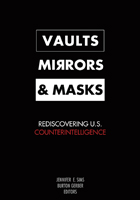
Decision makers matching wits with an adversary want intelligence—good, relevant information to help them win. Intelligence can gain these advantages through directed research and analysis, agile collection, and the timely use of guile and theft. Counterintelligence is the art and practice of defeating these endeavors. Its purpose is the same as that of positive intelligence—to gain advantage—but it does so by exploiting, disrupting, denying, or manipulating the intelligence activities of others. The tools of counterintelligence include security systems, deception, and disguise: vaults, mirrors, and masks.
In one indispensable volume, top practitioners and scholars in the field explain the importance of counterintelligence today and explore the causes of—and practical solutions for—U.S. counterintelligence weaknesses. These experts stress the importance of developing a sound strategic vision in order to improve U.S. counterintelligence and emphasize the challenges posed by technological change, confused purposes, political culture, and bureaucratic rigidity. Vaults, Mirrors, and Masks skillfully reveals that robust counterintelligence is vital to ensuring America's security.
Published in cooperation with the Center for Peace and Security Studies and the George T. Kalaris Memorial Fund, Edmund A. Walsh School of Foreign Service, Georgetown University.

In this penetrating critical analysis of Louis Farrakhan's ascent to national influence, Robert Singh argues that the minister's rise to prominence is a function of race and reaction in contemporary America. Singh probes the origins and significance of Farrakhan in American politics.
Drawing on published and unpublished records, personal interviews, and Farrakhan's writings and speeches, Singh places Farrakhan expressly within the "paranoid style" of such reactionaries as Jesse Helms and Joseph McCarthy. Examining Farrakhan's biographical details, religious beliefs, political strategies, and relative influence, Singh argues that Farrakhan is an extreme conservative who exploits both black-white divisions and conflicts within the black community for personal advancement.
Singh proposes that Farrakhan's complex appeal to African-Americans is based on his ability to orchestrate the diffuse forces of African-American protest against the status quo. Paradoxically, says Singh, Farrakhan has achieved his position in part by positioning himself against most African-American political leaders, a tactic made possible by the extent to which black American politics now displays the same basic features as American politics in general. By stoking the fires of fear and hatred yet effecting no real changes, Farrakhan poses a greater threat to black Americans than to whites.
The Farrakhan Phenomenon is written in a clear, accessible style that will appeal to general readers concerned about race relations as well as to scholars of American history and politics. It reveals a shrewd opportunist who has capitalized on America's continuing failure to deal with its serious and abiding race problems.

Unique among readers in American political and social thought, From Many, One is a broad and balanced anthology that explores the problem of diversity and American political identity throughout American history. From the classic texts of the American political tradition to diverse minority writings, this book offers a wide spectrum of ideas about identity, gender, immigration, race, and religion, and addresses how these issues relate to the concept of national unity.
Covering the gamut of viewpoints from majority to minority, from conservative to radical, from assimilationist to separatist, the authors range from the Founding Fathers to Frederick Jackson Turner, from Abigail Adams to bell hooks and Catharine MacKinnon; from Abraham Lincoln to Malcolm X; from Roger Williams to Ralph E. Reed.
Sinopoli's extensive introductory and concluding essays set the context for and draw out the implications of the fifty readings. The conclusion includes case studies of three minority groups—homosexuals, Mexican-Americans, and Chinese-Americans—to illustrate further the themes of the volume. Brief introductions to each reading and to each of the five sections provide background information.
In examining one of the central questions of American public life—the issue of national diversity—From Many, One will be a useful text for courses in American political thought, sociology, American Studies, and American history.

Lucid and compellingly written, Patricia Siplon has immersed herself in the history and ongoing firestorms of how AIDS policies are influenced, fought over, and enacted in the United States. AIDS and the Policy Struggle in the United States is equally as engrossing and as revealing in its own way as And the Band Played On. With an initial chapter that clearly follows the tangled historical string from the first realizations of a medical emergency to today's overwhelming worldwide epidemical crisis, she goes on to look at how medical treatments have changed and grown; how blood policies were formed; how value-based debates raged and continue to rage over prevention; how communities developed to first respond to the crisis, and later organized to fight for health care; and finally-now that AIDS is recognized for the global crisis it is-how foreign policy is being shaped.
Invaluable for activists and anyone involved in fighting for the humane treatment of people with HIV/AIDS around the world, this is also an important and insightful guide to the how and what of public policy as it is fashioned out of the clay of U.S. democratic institutions.

The first annotated edition of Syrian writer Nihad Sirees's The Silence and the Roar, created for the Arabic language classroom
Al-Samt wa-al-Sakhab (The Silence and the Roar) is an award-winning novella by Syrian author Nihad Sirees. This edition—abridged and in the original Arabic with vocabulary aids, reading questions, and supplementary materials—introduces intermediate and advanced Arabic language students to the world of contemporary Arab literature.
In Al-Samt wa-al-Sakhab, Sirees weaves an Orwellian tale of freedom, love, and resistance amid a backdrop of bureaucracy and despotism. Fathi Sheen is a writer living in an unnamed Middle Eastern country whose work has been silenced by the ruling government and its despotic leader. On the twentieth anniversary of the regime, Fathi decides to leave the roar of the parade snaking its way through the city and visit his mother and his girlfriend, but when he stops to help a student being beaten by the police, his ID is confiscated. With no choice but to report to the police station, Fathi fights to stay sane against the oppressive—and increasingly absurd—state bureaucracy. This political satire, originally published in 2004 but no less relevant to our times, shows how to remain free even in captivity.
In this abridged and annotated edition for the Arabic language classroom, editor Hanadi Al-Samman includes a historical and cultural preface in Arabic, a biography of Sirees, footnotes for vocabulary aid, and pre- and postreading questions and activities to guide students through the book's literary concepts and to teach literary analysis skills. An interview with Sirees and excerpt readings in his voice are available on the publisher's website. Authorized by Sirees, this edition preserves the author's original style while making the novella easy to use in the classroom or to read independently.
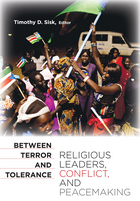
Civil war and conflict within countries is the most prevalent threat to peace and security in the opening decades of the twenty-first century. A pivotal factor in the escalation of tensions to open conflict is the role of elites in exacerbating tensions along identity lines by giving the ideological justification, moral reasoning, and call to violence. Between Terror and Tolerance examines the varied roles of religious leaders in societies deeply divided by ethnic, racial, or religious conflict. The chapters in this book explore cases when religious leaders have justified or catalyzed violence along identity lines, and other instances when religious elites have played a critical role in easing tensions or even laying the foundation for peace and reconciliation.
This volume features thematic chapters on the linkages between religion, nationalism, and intolerance, transnational intra-faith conflict in the Shi’a-Sunni divide, and country case studies of societal divisions or conflicts in Egypt, Israel and Palestine, Kashmir, Lebanon, Nigeria, Northern Ireland, Sri Lanka, Sudan, and Tajikistan. The concluding chapter explores the findings and their implications for policies and programs of international non-governmental organizations that seek to encourage and enhance the capacity of religious leaders to play a constructive role in conflict resolution.

From advance planning to advice on bridging the return from the twenty-four week retreat to everyday life, this Director's Guide provides assistance to those organizing Ignatian retreats based on James W. Skehan's Place Me with Your Son and those wishing to deepen the previous retreat experience. This volume explains the foundations of each phase of the retreat and suggests ways to prepare for the transitions between the phases. Skehan reviews the basic concepts; anticipates problems and opportunities that may arise in each week; offers possible responses to exercitants' questions; and interprets Scriptural passages for modern readers. The Guide also includes a list of recommended supplemental readings and guidelines for integrating the retreat into the liturgical year.

Arranged as a twenty-four week retreat in four phases, this edition is a guide to The Spiritual Exercises of St. Ignatius Loyola. It incorporates "centering" exercises of awareness patterned on Eastern or Buddhist meditation practices and devotional exercises similar to or drawn from those found in Sadhana, by the late Anthony de Mello, SJ. Poems and prayers by Rainer Maria Rilke, Rabindranath Tagore, T.S. Eliot, Ezra Pound, Edith Sitwell, and others are also included, as well as materials from Teilhard de Chardin's Divine Milieu.

Is the "private" experience of religion counterproductive to engagement in public life? Does the "public" experience of religion contribute anything distinctive to civic engagement? Pews, Prayers, and Participation offers a fresh approach to key questions about what role religion plays in fostering civic responsibility in contemporary American society. Written by five prominent scholars of religion and politics, led by Calvin College's Corwin Smidt, the book brilliantly articulates how religion shapes participation in a range of civic activities—from behaviors (such as membership in voluntary associations, volunteering, and charitable contributions) to capacities (such as civic skills and knowledge), to virtues (such as law-abidingness, tolerance, and work ethic).
In the course of their study the authors examine whether an individual exhibits a diminished, a privatized, a public, or an integrated form of religious expression, based on the individual's level of participation in both the public (worship) or private (prayer) dimensions of religious life. They question whether the privatization of religious life is counterproductive to engagement in public life, and they show that religion does indeed play a significant role in fostering civic responsibility across each of its particular facets.
Pews, Prayers, and Participation is a bold and provocative clarion call to the continuing importance and changing nature of religion in American public life. It will be of particular interest to students and scholars of religion and politics, and culture and politics, as well as general readers with an interest in the impact of religion in the public sphere.

Case studies explore how women’s rights shape state responses to sex trafficking and show how politically empowering women can help prevent and combat human trafficking
Human trafficking for the sex trade is a form of modern-day slavery that ensnares thousands of victims each year, disproportionately affecting women and girls. While the international community has developed an impressive edifice of human rights law, these laws are not equally recognized or enforced by all countries. Sex Trafficking and Human Rights demonstrates that state responsiveness to human trafficking is shaped by the political, social, cultural, and economic rights afforded to women in that state.
While combatting human trafficking is a multiscalar problem with a host of conflating variables, this book shows that a common theme in the effectiveness of state response is the degree to which women and girls are perceived as, and actually are, full citizens. By analyzing human trafficking cases in India, Thailand, Russia, Nigeria, and Brazil, they shed light on the factors that make some women and girls more susceptible to traffickers than others.
This important book is both a call to understanding and a call to action: if the international community and state governments are to responsibly and effectively combat human trafficking, they must center the equality of women in national policy.
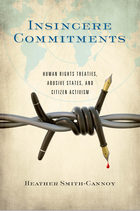
Paradoxically, many governments that persistently violate human rights have also ratified international human rights treaties that empower their citizens to file grievances against them at the United Nations. Therefore, citizens in rights-repressing regimes find themselves with the potentially invaluable opportunity to challenge their government’s abuses. Why would rights-violating governments ratify these treaties and thus afford their citizens this right? Can the mechanisms provided in these treaties actually help promote positive changes in human rights?
Insincere Commitments uses both quantitative and qualitative analysis to examine the factors contributing to commitment and compliance among post-Soviet states such as Slovakia, Hungary, Kyrgyzstan, and Tajikistan. Heather Smith-Cannoy argues that governments ratify these treaties insincerely in response to domestic economic pressures. Signing the treaties is a way to at least temporarily keep critics of their human rights record at bay while they secure international economic assistance or more favorable trade terms. However, she finds that through the specific protocols in the treaties that grant individuals the right to petition the UN, even the most insincere state commitments to human rights can give previously powerless individuals—and the nongovernmental and intergovernmental organizations that partner with them—an important opportunity that they would otherwise not have to challenge patterns of government repression on the global stage.
This insightful book will be of interest to human rights scholars, students, and practitioners, as well as anyone interested in the UN, international relations, treaties, and governance.

Cartas e Cronicas contains three dozen selections form Brazilian newspapers accompanied by vocabulary lists and comprehension exercises.

For well over a century the Catholic Church has articulated clear positions on many issues of public concern, particularly economics, capital punishment, foreign affairs, sexual morality, and abortion. Yet the fact that some of the Church's positions do not mesh well with the platforms of either of the two major political parties in the U.S. may make it difficult for Americans to look to Catholic doctrine for political guidance. Scholars of religion and politics have long recognized the potential for clergy to play an important role in shaping the voting decisions and political attitudes of their congregations, yet these assumptions of political influence have gone largely untested and undemonstrated.
Politics in the Parish is the first empirical examination of the role Catholic clergy play in shaping the political views of their congregations. Gregory Allen Smith draws from recent scholarship on political communication, and the comprehensive Notre Dame Study of Parish Life, as well as case studies he conducted in nine parishes in the mid-Atlantic region, to investigate the extent to which and the circumstances under which Catholic priests are influential in shaping the politics of their parishioners.
Smith is able to verify that clergy do exercise political influence, but he makes clear that such influence is likely to be nuanced, limited in magnitude, and exercised indirectly by shaping parishioner religious attitudes that in turn affect political behavior. He shows that the messages that priests deliver vary widely, even radically, from parish to parish and priest to priest. Consequently, he warns that scholars should exercise caution when making any global assumptions about the political influence that Catholic clergy affect upon their congregations.

A critical look at how China’s growing strategic arsenal could impact a rapidly changing world order
China’s strategic capabilities and doctrine have historically differed from the United States’ and Russia’s. China has continued to modernize and expand its arsenal despite its policy of no first use, while the United States and Russia have decreased deployed weapons stocks.
This volume brings together an international group of distinguished scholars to provide a fresh assessment of China's strategic military capabilities, doctrines, and political perceptions in light of rapidly advancing technologies, an expanding and modernizing nuclear arsenal, and an increased great-power competition with the United States.
Analyzing China's strategic arsenal is critical for a deeper understanding of China’s relations with both its neighbors and the world. Without a doubt, China’s arsenal is growing in size and sophistication, but key uncertainties also lie ahead. Will China’s new capabilities and confidence lead it to be more assertive and take more risks? Will China’s nuclear traditions change as the strategic balance improves? Will China’s approach to military competition be guided by a notion of strategic stability or not? Will there be a strategic arms race with the United States? China's Strategic Arsenal provides a current understanding of these issues as we strive for a stable strategic future with China.
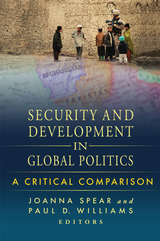
Security and development matter: they often involve issues of life and death and they determine the allocation of truly staggering amounts of the world’s resources. Particularly since the start of the wars in Afghanistan and Iraq, there has been momentum in policy circles to merge the issues of security and development to attempt to end conflicts, create durable peace, strengthen failing states, and promote the conditions necessary for people to lead healthier and more prosperous lives.
In many ways this blending of security and development agendas seems admirable and designed to produce positive outcomes all around. However, it is often the case that the two concepts in combination do not receive equal weight, with security issues getting priority over development concerns. This is not desirable and actually undermines security in the longer term. Moreover, there are major challenges in practice when security practitioners and development practitioners are asked to agree on priorities and work together.
Security and Development in Global Politics illuminates the common points of interest but also the significant differences between security and development agendas and approaches to problem solving. With insightful chapter pairings—each written by a development expert and a security analyst—the book explores seven core international issues: aid, humanitarian assistance, governance, health, poverty, trade and resources, and demography. Using this comparative structure, the book effectively assesses the extent to which there really is a nexus between security and development and, most importantly, whether the link should be encouraged or resisted.

Viewed alternately as an obstacle to justice, an impediment to efficient government, and a tool by which some groups gain benefits and privileges at the expense of others, public administration threatens to become the whipping boy of American government. In this innovative look at the nation's bureaucracy, Michael W. Spicer revisits the values of the Constitution in order to reconcile the administrative state to its many critics.
Drawing on political and social philosophy, Spicer argues that there is a fundamental philosophical conflict over the role of reason in society between writers in public administration and the designers of the American Constitution. This examination of worldviews illuminates the problem that American government faces in trying to ground a legitimate public administration in the Constitution. Defending and developing the Founders' idea that political power, whatever its source, must be checked, he critically examines existing ideas about the role of public administration in American governance and offers an alternative vision of public administration more in line with the Founders' constitutional design. This book will provide fresh insights for anyone interested in the role of public administration in the United States today.
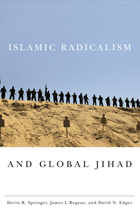
Jihadist ideology inspires a diverse and decentralized collection of radical groups to fight alleged enemies of Islam and to attempt to “restore” a holy caliphate to unite Muslim peoples across the Middle East, Africa, and Asia. Islamic Radicalism and Global Jihad provides unique insights into the philosophical foundations, strategic vision, organizational dynamics, and tactics of the modern jihadist movement—with specific attention to its primary driver, Al-Qa’ida.
Springer, Regens, and Edger draw heavily on Arabic language sources seldom seen in the West to explain what jihadists want and how radical thinkers have distorted the teachings of Islam to convince followers to pursue terrorism as a religious duty. With sophisticated and systematic analysis, the authors lead their readers on a fascinating intellectual journey through the differing ideas, goals, and vulnerabilities of the jihadist movement as it has evolved over time. The authors also impart wisdom from their own professional experience with terrorism, counterinsurgency, and intelligence to provide scholars, students, counterterrorism professionals, and general readers with this accessible overview of key radical Islamic thinkers and today’s jihadists.
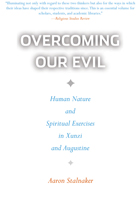
Can people ever really change? Do they ever become more ethical, and if so, how? Overcoming Our Evil focuses on the way ethical and religious commitments are conceived and nurtured through the methodical practices that Pierre Hadot has called "spiritual exercises." These practices engage thought, imagination, and sensibility, and have a significant ethical component, yet aim for a broader transformation of the whole personality. Going beyond recent philosophical and historical work that has focused on ancient Greco-Roman philosophy, Stalnaker broadens ethical inquiry into spiritual exercises by examining East Asian as well as classical Christian sources, and taking religious and seemingly "aesthetic" practices such as prayer, ritual, and music more seriously as objects of study.
More specifically, Overcoming Our Evil examines and compares the thought and practice of the early Christian Augustine of Hippo, and the early Confucian Xunzi. Both have sophisticated and insightful accounts of spiritual exercises, and both make such ethical work central to their religious thought and practice. Yet to understand the two thinkers' recommendations for cultivating virtue we must first understand some important differences. Here Stalnaker disentangles the competing aspects of Augustine and Xunxi's ideas of "human nature." His groundbreaking comparison of their ethical vocabularies also drives a substantive analysis of fundamental issues in moral psychology, especially regarding emotion and the complex idea of "the will," to examine how our dispositions to feel, think, and act might be slowly transformed over time. The comparison meticulously constructs vivid portraits of both thinkers demonstrating where they connect and where they diverge, making the case that both have been misunderstood and misinterpreted. In throwing light on these seemingly disparate ancient figures in unexpected ways, Stalnaker redirects recent debate regarding practices of personal formation, and more clearly exposes the intellectual and political issues involved in the retrieval of "classic" ethical sources in diverse contemporary societies, illuminating a path toward a contemporary understanding of difference.

Designed to be used simultaneously with Jusuur 1: Beginning Communicative Arabic, the Jusuur 1 Arabic Alphabet Workbook teaches students the letters, short vowels, and diacritics found in Arabic. As students learn new letters in the alphabet workbook, they strengthen their literacy skills through the reading and writing exercises in Jusuur 1.
A distinguishing feature of the Jusuur 1 Arabic Alphabet Workbook is that it introduces letters approximately in the order of letter frequency rather than in the traditional alphabetical order. This method, tested extensively in the classroom, enables students to begin to read and write meaningful phrases they are learning in Jusuur 1: Beginning Communicative Arabic as early as possible. Each letter section includes an introduction to the letter and its shapes and sound; space for writing practice; and activities to practice reading and dictation.
Features of the alphabet workbook include:-Authentic examples of language drawn from poetry, billboards, signs, and other sources to help students learn to identify letters -Samples of real Arabic handwriting, and guidance on recognizing and writing letters that look different when printed versus handwritten
Resources available on JusuurTextbook.com:-Audio files for dictation and listening exercises-Extensive instructor’s resources, including pedagogical notes, answers to activities, and recommendations for lesson and unit planning
By the end of the Jusuur 1 Arabic Alphabet Workbook, students will have learned all of the letters and sounds of the Arabic alphabet. Used in conjunction with Jusuur 1: Beginning Communicative Arabic, this workbook will give students a firm foundation in Arabic literacy to continue their studies.

Jusuur 1 presents a well-rounded curriculum that encourages active communication in Arabic from day one and is suitable for engaging students at a variety of levels including high school, community college, and four-year colleges.
Students learn the letters and sounds of Arabic with the accompanying Jusuur 1 Arabic Alphabet Workbook, while they simultaneously use Jusuur 1 to work through thematically organized lessons on such topics as greetings, hospitality, free time, and family. Jusuur 1 invites students to make the linguistic, social, and cultural connections key to language acquisition through carefully scaffolded vocabulary and grammar activities, cultural explanations, and frequent opportunities for reflection. A series of companion videos, filmed in Jordan, offers a unique introduction to common everyday interactions in the Arab world.
Jusuur 1 is the first of two books in the Jusuur Arabic Language Program; students who successfully finish the program will be able to communicate at novice-high or intermediate-low levels of proficiency.
The Jusuur curriculum, which draws from the pedagogical strengths of the best-selling Al-Kitaab Arabic Language Program, provides students with a wealth of written and audio-visual materials to develop skills in speaking, listening, reading, and writing. Instructors will benefit from extensive complementary instructor’s resources, including teacher’s guides, worksheets, and audio recordings, making it easy to design an enriching and engaging experience for students.

In this succinct introduction to modern Arabic literature of the nineteenth and twentieth centuries, Paul Starkey traces its development from the medieval Arabic literary tradition—beginning in the sixth-century with nomadic Bedouin poetry and the Qur'an—through new literary forms adapted from Western imaginative literature. He explores the interaction between social, political, and cultural change in the Middle East and northern Africa and the development of a modern Arabic literary tradition.
From the early nineteenth century through World War I, the Western genres of poetry, the novel, short story, and drama reached various parts of the Arabic-speaking world. Starkey discusses the resultant evolution of Arabic literature in separate sections on poetry, prose writing, and the theatre in Egypt, the Levant, Iraq, and northern Africa, from early contact through the emergence of women's literary voices in the 1960s to contemporary writers.
Arabic terms are presented in transcription, and an extensive bibliography provides suggestions for further reading. Modern Arabic Literature is the perfect introduction for readers interested in the contemporary Middle East or in comparative, colonial, world, or modern literature.

This book offers a clear and systematic introduction to virtue ethics, a topic which has inspired one of the most interesting contemporary debates in ethical theory—the question of whether virtues can replace duties as the primary notion in ethical theory.
The volume comprises an introduction to virtue ethics by Daniel Statman and a collection of the most important essays published on the topic in the last decade. The essays encompass a wide range of aspects: the difference between virtue ethics and traditional duty ethics; arguments for and against virtue ethics; the practical implications of virtue ethics; and Aristotelian and Kantian attitudes towards virtue ethics.

A Few Months to Live describes what dying is like from the perspectives of nine terminally ill individuals and their caregivers. Documenting a unique study of end-of-life experiences that included detailed conversations in home care settings, the book focuses on how participants lived their daily lives, understood their illnesses, coped with symptoms-especially pain-and searched for meaning or spiritual growth in their final months of life. The accounts are presented largely in the participants' own words, illuminating both the medical and non-medical challenges that arose from the time each learned the "bad news" through their final days of life and memorial services.
Describing the nationwide crisis that surrounds end-of-life care, the authors contend that informal caregiving by relatives and close friends is an enormous and too-often invisible resource that deserves close and public attention. By incorporating not only the ill person's but also the family's perspective, they portray the nine participants in the contexts of their daily lives and relationships rather than simply as patients. Addressing such issues as palliative care, quality of life, financial hardship, grief and loss, and communications with medical personnel, the authors identify how families, professionals, and communities can respond to the challenges of terminal illness and the need to confront life's end.

Over the past three decades, governments at the local, state, and federal levels have undertaken a wide range of bold innovations, often in partnership with nongovernmental organizations and communities, to try to address their environmental and natural resource management tasks. Many of these efforts have failed. Innovations, by definition, are transitory. How, then, can we establish new practices that endure?
Toddi A. Steelman argues that the key to successful and long-lasting innovation must be a realistic understanding of the challenges that face it. She examines three case studies—land management in Colorado, watershed management in West Virginia, and timber management in New Mexico—and reveals specific patterns of implementation success and failure. Steelman challenges conventional wisdom about the role of individual entrepreneurs in innovative practice. She highlights the institutional obstacles that impede innovation and its longer term implementation, while offering practical insight in how enduring change might be achieved.

Long isolated by rigid military rule, Burma, or Myanmar, is one of the least known, significantly sized states in the world. Possessed of a rich cultural history yet facing a range of challenges to stability and growth, it has struck the imaginations of those concerned not only with geopolitical or trade affairs but also with poverty, health, and human rights. David I. Steinberg sheds new light on this reclusive state by exploring issues of authority and legitimacy in its politics, economics, social structure, and culture since the popular uprising and military coup of 1988.
Exploring the origins of that year’s tumultuous events, Steinberg analyzes a generation of preceding military governments and their attempts to address the nation’s problems. He focuses on the role of the military, the effects of Burma’s geopolitical placement, the plight of the poor, the destruction of civil society, and rising ethnic tensions. While taking into account the importance of foreign observers as counterpoints to official views, suppliers of economic aid, and advocates of reform, Steinberg contends that ultimately, the solutions to Myanmar’s varied problems lie with the Burmese themselves and the policies of their government.
The paperback edition includes a postcript that reveals the most current and critical issues facing Burma since the publication of the original hardcover in March 2001. Steinberg brings readers up to date on the recent release of political prisoners, economic and military conditions, United Nations actions, and the complex, ever-changing relationship between Thailand and Myanmar.
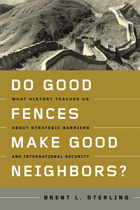
A number of nations, conspicuously Israel and the United States, have been increasingly attracted to the use of strategic barriers to promote national defense. In Do Good Fences Make Good Neighbors?, defense analyst Brent Sterling examines the historical use of strategic defenses such as walls or fortifications to evaluate their effectiveness and consider their implications for modern security.
Sterling studies six famous defenses spanning 2,500 years, representing both democratic and authoritarian regimes: the Long Walls of Athens, Hadrian’s Wall in Roman Britain, the Ming Great Wall of China, Louis XIV’s Pré Carré, France’s Maginot Line, and Israel’s Bar Lev Line. Although many of these barriers were effective in the short term, they also affected the states that created them in terms of cost, strategic outlook, military readiness, and relations with neighbors. Sterling assesses how modern barriers against ground and air threats could influence threat perceptions, alter the military balance, and influence the builder’s subsequent policy choices.
Advocates and critics of strategic defenses often bolster their arguments by selectively distorting history. Sterling emphasizes the need for an impartial examination of what past experience can teach us. His study yields nuanced lessons about strategic barriers and international security and yields findings that are relevant for security scholars and compelling to general readers.

The Modern Arabic Literary Language is a thoughtful examination of the changes that the Arabic language has undergone in its transition from its roots in classical Arabic to a language able to meet the demands of twentieth-century life.
In this volume a respected and masterful scholar of the Arabic language Jaroslav Stetkevych notes the ways that new words have been incorporated into the language, ranging from deriving new terms from existing roots (for example, the word for "newspaper" derives from the word meaning "sheet to write on") to downright assimilation of foreign words. Also noting the changes in grammar and semantics, Stetkevych illustrates how literary Arabic has become a more flexible language. Originally published in 1970, this volume is a clear assessment of lexical and stylistic developments in Modern Literary Arabic.
This classic book is an important resource for scholars and advanced students of Arabic language and linguistics who wish to study the complexities of language change and lexical expansion.

With the rush of calamitous events in recent years—the September 11 terror attacks, the Iraq imbroglio, and hurricanes Katrina and Rita—Americans feel themselves to be living in dark times. Trust in one another and in the government is at low ebb. People in public service face profound challenges to the meaning and efficacy of their work. Where can a public servant turn for a public philosophy to sustain practice?
Inspired by Hannah Arendt and several other philosophers, Governance in Dark Times is the first book to explore the philosophical and value underpinnings needed to guide public servants in these times. Featuring down-to-earth discussions of such issues as terrorism, torture, and homeland security, it suggests ways for people in government to think more deeply, judge more wisely, and act more meaningfully. Camilla Stivers argues that the most urgent requirement in dark times is re-kindling what Arendt called "the light of the public," and offers practical steps for public servants to create spaces for citizen dialogue and engagement in public life. Ideas like "governance of the common ground" and "public service as social hope" will spark discussion and encourage renewed dedication to the work of governing.
Grounded in the author's more than thirty years of teaching and administrative practice, Governance in Dark Times urges public servants in clear, jargon-free prose to reflect, to understand the world we live in, and to act responsibly, both individually and with fellow citizens.

The emergence of a master artist alongside his first major collection, created during a golden age of art in the nation’s capital
Renowned for his innovative work with silkscreen printing, Lou Stovall’s works are part of numerous collections, including the National Gallery of Art, Smithsonian American Art Museum, and Phillips Collection. Washington Post art critic Paul Richard once wrote, “As a printer of his own art, and of the art of many others, as a framer and installer and shepherd of collections, Stovall has inserted more art into Washington than almost anyone in town.”
Of the Land: The Art and Poetry of Lou Stovall presents a series of prints and accompanying poems that showcase the artist’s work during the 1970s, when he was developing his unique silkscreen technique and exploring both natural and abstract elements. An introduction by the book’s editor and artist’s son, Will Stovall, along with an autobiography from the artist anchor the Of the Land series in its time and place—a period of jazz, protest, and prolific art production in Washington, DC, that birthed the Washington Color School. Stovall’s contributions, as well as his collaborations with well-known artists like Jacob Lawrence, Sam Gilliam, Elizabeth Catlett, and Robert Mangold, have cemented him as one of the most significant American artists of our age.
Part of a tradition of African American artists and thinkers who met at Howard University, Lou Stovall created the Workshop in 1968, a small, active silkscreen studio printing posters for arts and DC-focused events. His deep influence on the silkscreen medium, the art community, and DC will be part of his lasting legacy.

A Dictionary of Syrian Arabic provides Syrian terms for the language spoken in everyday life by Muslims primarily in Damascus, but understandable throughout Syria as well as in the broader linguistic areas of present-day Lebanon, Jordan, and among the Palestinians and the Arabic-speaking population of Israel. Entries include examples, idioms, and common phrases to illustrate usage. The Arabic terms are presented in transcription. It is useful for students of Arabic, scholars wishing to train in the Syrian dialect, and visitors and travelers to Syria and other nations where the dialect is spoken. A thorough introduction outlines the sociolinguistic situation in Syria and covers phonology, morphology, syntax, grammar, and vocabulary. Alongside the other Arabic language-learning and reference works published by Georgetown University Press, this dictionary is yet another invaluable volume on spoken Arabic, belonging at the side of travelers and scholars, and on the shelves of research and reference libraries.

Bridging the gap between theoretical linguistics and language teaching, Judith R. Strozer explores what recent theoretical advances suggest about learning a language after childhood and the implications for the design and execution of a foreign language program. Strozer outlines clearly, in nontechnical language, the major concepts of modern language theory, from Chomsky's theory of language through the most recent discoveries about the abstract foundations of language. She explains ideas about the evolution of a cognitive structure for language in the human brain, a "language faculty" or Universal Grammar that gives humans alone the creative ability to generate the infinite expressions of language. This innate universal schema for language endows humankind with a number a very broad principles applicable to all languages.
Turning to current advances in the theory of phrase structure, which has replaced our 2,000-year-old rules of grammar with highly abstract universal principles of language structure, she relates the latest discoveries about the foundations of language to ideas about how children learn languages. A child hearing a specific language can automatically set the parameters for the rules governing that particular language, much like setting a binary switch. But our ability to access this innate language mechanism automatically seems limited to childhood, until physical maturity somehow changes this brain function.
Arguing that adults need to learn consciously the systems and structures of another language that children acquire unconsciously, Strozer applies these latest theories about the nature of language and how we learn it to the design of foreign language programs for adults. She concludes with recommendations for developing a new kind of teaching program that would draw on comparative language research and include new pedagogic approaches.
Presenting state-of-the-art language theory in easily readable terms and illustrative examples, this book will be of interest to everyone interested in the latest understanding of the relationship between the brain and language, as well as to all professionals in linguistics and language education.

This book offers concrete and practical ideas for implementing content-based instruction—using subject matter rather than grammar—through eleven case studies of cutting-edge models in a broad variety of languages, academic settings, and levels of proficiency.
The highly innovative models illustrate content-based instruction programs for both commonly and less-commonly taught languages—Arabic, Croatian, French, German, Indonesian, Italian, Russian, Serbian, and Spanish—and for proficiency levels ranging from beginners to fluent speakers. They include single-teacher and multi-teacher contexts and such settings as typical language department classrooms, specialty schools, intensive language programs, and university programs in foreign languages across the curriculum.
All of the contributors are pioneers and practitioners of content-based instruction, and the methods they present are based on actual classroom experiences. Each describes the rationale, curriculum design, materials, and evaluation procedures used in an actual curriculum and discusses the implications of the approach for adult language acquisition.

Medical ethics draws upon methods from a wide array of disciplines, including anthropology, economics, epidemiology, health services research, history, law, medicine, nursing, philosophy, psychology, sociology, and theology.
In this first book to systematically examine, critique, and challenge some of these disciplines and their methods in light of their influence on medical ethics, leading scholars present particular methods that have played significant roles in the field. The methods addressed include philosophy, religion and theology, professional codes, law, casuistry, history, qualitative research, ethnography, quantitative surveys, experimental methods, and economics and decision science. Reviewing each, they provide descriptions of techniques, critiques, and notes on resources and training. Physician-assisted suicide and euthanasia are used as an illustration of the richness of multidisciplinary work applied to individual issues. Similarly, genetic testing is used as an example of how multiple descriptive methods may privilege certain findings.
Methods in Medical Ethics is a valuable resource for scholars, teachers, editors, and students in any of the disciplines that have contributed to the field. As a textbook and reference for graduate students and scholars in medical ethics, it offers a rich understanding of the complexities of both moral questions and their answers.
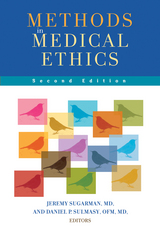
Medical ethics draws upon methods from a wide array of disciplines, including anthropology, economics, epidemiology, health services research, history, law, medicine, nursing, philosophy, psychology, sociology, and theology.
In this influential book, outstanding scholars in medical ethics bring these many methods together in one place to be systematically described, critiqued, and challenged. Newly revised and updated chapters in this second edition include philosophy, religion and theology, virtue and professionalism, casuistry and clinical ethics, law, history, qualitative research, ethnography, quantitative surveys, experimental methods, and economics and decision science. This second edition also includes new chapters on literature and sociology, as well as a second chapter on philosophy which expands the range of philosophical methods discussed to include gender ethics, communitarianism, and discourse ethics. In each of these chapters, contributors provide descriptions of the methods, critiques, and notes on resources and training.
Methods in Medical Ethics is a valuable resource for scholars, teachers, editors, and students in any of the disciplines that have contributed to the field. As a textbook and reference for graduate students and scholars in medical ethics, it offers a rich understanding of the complexities involved in the rigorous investigation of moral questions in medical practice and research.

Considering the communicative and symbolic roles of language in articulating national identity, Yasir Suleiman provides a fresh perspective on nationalism in the Middle East. The links between language and nationalism are delineated and he demonstrates how this has been articulated over the past two centuries.
Straddling the domains of cultural and political nationalism, Suleiman examines the Arab past (looking at the interpretation and reinvention of tradition, and myth-making); the clash between Arab and Turkish cultural nationalism in the 19th and early 20th century; readings of canonical treatises on the topic of Arab cultural nationalism, the major ideological trends linking language to territorial nationalism; and provides a research agenda for the study of language and nationalism in the Arab context.
This the first full-scale study of this important topic and will be of interest to students of nationalism, Arab and comparative politics, Arabic Studies, history, cultural studies and sociolinguistics.
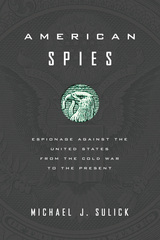
A history of Americans who spied against their country and what their stories reveal about national security
What's your secret?
American Spies presents the stunning histories of more than forty Americans who spied against their country during the past six decades. Michael Sulick, former head of the CIA's clandestine service, illustrates through these stories—some familiar, others much less well known—the common threads in the spy cases and the evolution of American attitudes toward espionage since the onset of the Cold War. After highlighting the accounts of many who have spied for traditional adversaries such as Russian and Chinese intelligence services, Sulick shows how spy hunters today confront a far broader spectrum of threats not only from hostile states but also substate groups, including those conducting cyberespionage.
Sulick reveals six fundamental elements of espionage in these stories: the motivations that drove them to spy; their access and the secrets they betrayed; their tradecraft, or the techniques of concealing their espionage; their exposure; their punishment; and, finally, the damage they inflicted on America's national security.
The book is the sequel to Sulick's popular Spying in America: Espionage from the Revolutionary War to the Dawn of the Cold War. Together they serve as a basic introduction to understanding America's vulnerability to espionage, which has oscillated between peacetime complacency and wartime vigilance, and continues to be shaped by the inherent conflict between our nation's security needs and our commitment to the preservation of civil liberties. Now available in paperback, with a new preface that brings the conversation up to the present, American Spies is as insightful and relevant as ever.
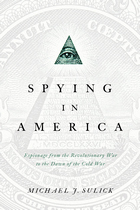
Can you keep a secret?
Maybe you can, but the United States government cannot. Since the birth of the country, nations large and small, from Russia and China to Ghana and Ecuador, have stolen the most precious secrets of the United States.
Written by Michael Sulick, former director of CIA’s clandestine service, Spying in America presents a history of more than thirty espionage cases inside the United States. These cases include Americans who spied against their country, spies from both the Union and Confederacy during the Civil War, and foreign agents who ran operations on American soil. Some of the stories are familiar, such as those of Benedict Arnold and Julius Rosenberg, while others, though less well known, are equally fascinating.
From the American Revolution, through the Civil War and two World Wars, to the atomic age of the Manhattan Project, Sulick details the lives of those who have betrayed America’s secrets. In each case he focuses on the motivations that drove these individuals to spy, their access and the secrets they betrayed, their tradecraft or techniques for concealing their espionage, their exposure and punishment, and the damage they ultimately inflicted on America’s national security.
Spying in America serves as the perfect introduction to the early history of espionage in America. Sulick’s unique experience as a senior intelligence officer is evident as he skillfully guides the reader through these cases of intrigue, deftly illustrating the evolution of American awareness about espionage and the fitful development of American counterespionage leading up to the Cold War.

Once rarely discussed in medical circles, the relationship between spirituality and health has become an important topic in health care. This change is evidenced in courses on religion and medicine taught in most medical schools, articles in journals such as the New England Journal of Medicine, and conferences being held all over the country. Yet, much of the discussion of the role of religion and spirituality in health care keeps the critical distance of only being about spirituality. A Balm for Gilead goes further, offering a work of spirituality.
Sulmasy moves between the poetic and the speculative, addressing his subject in the tradition of great spiritual writers like Augustine and Bonaventure. He draws from philosophical and theological sources—specifically, Hebrew and Christian scripture—to illuminate how the art of healing is integrally tied to a sense of the divine and our ultimate interconnectedness. Health care professionals—and anyone else involved with the care of the sick and dying—will find this series of meditations both inspiring and instructive.
Sulmasy addresses the spiritual malaise that physicians, nurses, and other health care workers experience in their professional lives, and explores how these Christian healers can be inspired to persevere in the care of the sick. Drawing on the parable of the prodigal son, for instance, Sulmasy illustrates how some physicians have put financial gain ahead of their patients, and how genuine spirituality might change their hearts. He examines both enigmatic topics such as the relationship between sinfulness, sickness, and suffering and the spirituality of more routine topics such as preventive medicine. In one especially stirring and poignant meditation, he reflects on the spirituality of dying in the light of Christian hope.
A Balm for Gilead interweaves prayer and reflection, pointing the way to a twenty-first-century spirituality for health care professionals and their patients.

The Rebirth of the Clinic begins with a bold assertion: the doctor-patient relationship is sick. Fortunately, as this engrossing book demonstrates, the damage is not irreparable. Today, patients voice their desires to be seen not just as bodies, but as whole people. Though not willing to give up scientific progress and all it has to offer, they sense the need for more. Patients want a form of medicine that can heal them in body and soul. This movement is reflected in medical school curricula, in which courses in spirituality and health care are taught alongside anatomy and physiology. But how can health care workers translate these concepts into practice? How can they strike an appropriate balance, integrating and affirming spirituality without abandoning centuries of science or unwittingly adopting pseudoscience?
Physician and philosopher Daniel Sulmasy is uniquely qualified to guide readers through this terrain. At the outset of this accessible, engaging volume, he explores the nature of illness and healing, focusing on health care's rich history as a spiritual practice and on the human dignity of the patient. Combining sound theological reflection with doses of healthy skepticism, he goes on to describe empirical research on the effects of spirituality on health, including scientific studies of the healing power of prayer, emphasizing that there are reasons beyond even promising research data to attend to the souls of patients. Finally, Sulmasy devotes special attention and compassion to the care of people at the end of life, incorporating the stories of several of his patients.
Throughout, the author never strays from the theme that, for physicians, attending to the spiritual needs of patients should not be a moral option, but a moral obligation. This book is an essential resource for scholars and students of medicine and medical ethics and especially medical students and health care professionals.

Never in history have 1,322 words held out such extraordinary determination to be free as those found in the Declaration of Independence. In 1787, "We the people" were the three words that not only engendered a new and cohesive nation; they went on to change the face of the world as well. In 1791, the first ten Amendments to the Constitution of the United States of America, known to us as the Bill of Rights introduced the world to the concept of those singular rights that ought to belong to every free individual.
In one compact volume, the full texts of both the Declaration of Independence and the Constitution of the United States of America with all ratified twenty-seven Amendments to the Constitution are side by side—along with another of America's seminal documents, Thomas Jefferson's Virginia Statute for Religious Freedom, an additional world-changing statement that codified for the first time that one cannot be required by law to support or prefer any belief or be punished for those one does profess—and the basis for what we have come to know as the "wall of separation" between church and state.
Who we are and what we are free to be as citizens of the United States of America is contained between these covers. Cass R. Sunstein prefaces the volume with a succinct history and interpretation of the place and meaning of both the Declaration and the Constitution in American life. Enhanced by an index and suggestions for further reading, this volume, small in size but overwhelming in the impact of its contents, belongs in the home of every citizen of the United States.

Different forms of city government are in widespread use across the United States. The two most common structures are the mayor-council form and the council-manager form. In many large U.S. cities, there have been passionate movements to change the structure of city governments and equally intense efforts to defend an existing structure. Charter change (or preservation) is supported to solve problems such as legislative gridlock, corruption, weak executive leadership, short-range policies, or ineffective delivery of services. Some of these cities changed their form of government through referendum while other cities chose to retain the form in use.
More than Mayor or Manager offers in-depth case studies of fourteen large U.S. cities that have considered changing their form of government over the past two decades: St. Petersburg, Florida; Spokane, Washington; Hartford, Connecticut; Richmond, Virginia; San Diego, California; Oakland, California; Kansas City, Missouri; Grand Rapids, Michigan; Dallas, Texas; Cincinnati, Ohio; El Paso, Texas; Topeka, Kansas; St. Louis, Missouri; and Portland, Oregon. The case studies shed light on what these constitutional contests teach us about different forms of government—the causes that support movements for change, what the advocates of change promised, what is at stake for the nature of elected and professional leadership and the relationship between leaders, and why some referendums succeeded while others failed. This insightful volume will be of special interest to leaders and interest groups currently considering or facing efforts to change the form of government as well as scholars in the field of urban studies.
READERS
Browse our collection.
PUBLISHERS
See BiblioVault's publisher services.
STUDENT SERVICES
Files for college accessibility offices.
UChicago Accessibility Resources
home | accessibility | search | about | contact us
BiblioVault ® 2001 - 2024
The University of Chicago Press


